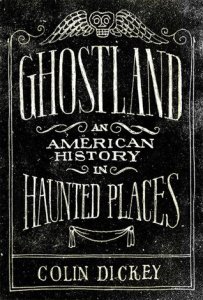 Ghostland: An American History in Haunted Places
Ghostland: An American History in Haunted Places
by Colin Dickey
Pub Date: October 4, 2016
“If you want to understand a place, ignore the boastful monuments and landmarks, and go straight to the haunted houses.”
Just in time for Halloween, here’s a fun and intellectual pick not only full of some fascinating ghost stories, but also some fascinating history. The author traveled across the United States seeking out haunted places, and looking into not only the truth behind those stories, but also what those stories say about the people who tell them, the people who believe them, the people who seek them out, and the culture that reveres them. I found myself pretty riveted from the first chapter on. The author doesn’t claim to believe these stories, or convince you to believe them, here merely lays them out with other evidence gathered, and allows you to come to your own conclusions.
Personally, I love a good ghost story. And I think that most of them are made up for scares, many are based in fact, or have some facts in them, and a small margin may even be true, though likely embellished. Who am I to argue with someone’s experiences with the thin veil that separates the living from the dead? Dickey covers some well-known ghost stories, like that of the Salem Witch Trials and the Winchester Mystery House, and other more locally-relevant ghost stories. Some focus on a person, some on a house, some on a place. (The author also recently wrote this entertaining piece about the correlation between hauntings and McMansions.)
One chapter I found particularly interesting focused on Civil War ghosts. I am a total Civil War buff and collecting Civil War-era ghost stories is fun for me. It talked about some of the typical type of hauntings around Gettysburg and Shiloh battlefields, and slowly evolved into how the Ku Klux Klan used the idea of ghosts and fear of ghosts to enact their early reign of terror. They would claim to be ghosts of Confederate soldiers out to seek vengeance on hapless former slaves and perform some illusion to make it seem as though they were supernatural to get a scare out of their victims. The author does point out that it’s debatable whether or not the former slaves believed the “ghosts” — they could have been feigning fright to appease the men terrorizing them so they would go away sooner and with minimal damage or violence.
What I like about this book is it’s a fun history book. You’re learning history, just through a different (and entertaining) lens. It causes you to think about how we remember our dead, how we treat our ancestors, and what kind of impression we ourselves might leave one day. While you yourself may not believe in ghosts to the extent of others, you might start looking at ghost stories in a different light and discern new things about the people and places involved. (You might also try another book I reviewed last year called American Ghost.) This isn’t a book looking to give you a fright, but it is full of some great stories that could be fun around a campfire as well.
